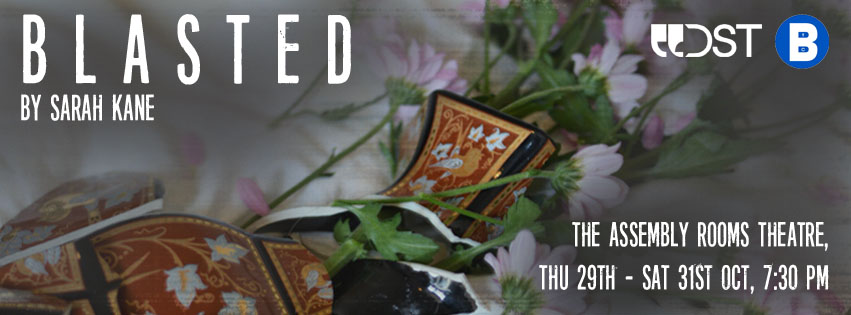
‘a slick and impacting play’
As the program for Blasted states, “this is a piece of theatre that has provoked some of the strongest reactions in British dramatic history.” It is a play that unflinchingly addresses controversial issues such as domestic violence, cannibalism, and rape to name a few. Many of these atrocious acts are carried out on stage. The controversial nature of Blasted, combined with the fact that I had thoroughly enjoyed BTC’s last offering of The Lieutenant of Inishmore, made me incredibly excited to watch this play. It is safe to say it more than surpassed my high expectations.
The first act focuses on the aggressive and abusive Ian (Henry Fell) and the vulnerable yet courageous Cate (Polly Norkett) who stay the night in a hotel room together. The play shocks from the start with Ian’s casual racism and rape of the epileptic Cate. The connection between public and private violence is firmly established with the arrival of The Soldier (Greg Plummer), implying foreign conflicts are never far from impacting our own lives. The change in direction of the play at the start of the second act was brilliantly conveyed with lighting, and the powerful image of the destroyed, smoke-filled hotel room.
All three actors should be highly commended. Norkett’s physicality expertly conveyed the complexity of her character, gaining the audiences sympathy with her vulnerability, yet also allowing us to admire the unbelievable defiance and humanity Cate conveys in the face of inhumane acts. The way she was able to effortlessly express and change between a vast range of emotions, especially when silent, was particularly impressive. Fell and Plummer had difficult tasks of playing characters who on the surface seem like unforgivable monsters. It is a credit to both actors that despite the atrocities that both their characters commit, they managed to portray a degree of humanity – Plummer as The Solider mourning his dead girlfriend and Fell in Ian’s transition from abuser to victim. Fell’s versatility never allowed his character to be two-dimensional, making Ian entirely credible to the audience. Plummer’s commanding stage presence meant his menacing threats, especially when delivered to the audience, were genuinely terrifying.
Without a doubt, director Nikihl Vyas deserves huge admiration for this production of Blasted – not least for his bravery in selecting such a dark and complex piece of work to put on in Durham. It was clear that meticulous planning had gone into the play, with lighting, sound effects and props chosen effectively, all enhancing the experience as a whole. The deliberately long, often uncomfortable, silences during the first act created and sustained the air of tension and foreboding, before the more explosive second act. The unorthodox stage directions in the play would have undoubtedly been difficult to direct. However, it appeared as though these were handled with ease, resulting in a slick and impacting play.
Blasted will undoubtedly be divisive amongst audience members. Some may claim that the violence seen and discussed on stage is used excessively for shock value. I would disagree and argue that it constantly reminds us that the horrors in our world may not be as far away as we think. For me it was not the images of horror that were the most impacting, but rather those of Cate desperately trying to save an orphaned baby, and her feeding a dying Ian, as a glimmer of hope is offered even in the bleakest of situations. Therefore the excessive violence in contrast with these moments highlights our human capacity for compassion, encompassed by Cate. Vyas warns in the program that “this play won’t be everyone’s cup of tea”. However, if you’re after an evening of fantastic acting, a thought provoking story, and a play that will remain with you long after the curtain closes, I would strongly recommend that you go and watch BTC’s production of Blasted.
